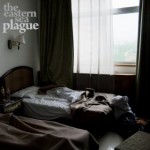The Eastern Sea, Plague

Grace — that’s what it is, I think. There’s this weird, serene feeling I get whenever I listen to The Eastern Sea, this strange calmness that rolls over me like a wave and leaves me drifting along, pulled by the music as it makes its way downstream. Singer/guitarist/songwriter Matthew Hines lets each song build slowly, organically, in a way that’s astoundingly unforced and, well, perfect.
He and the other members of the band — on this recording, drummer Zach Duran, bassist/guitarist Tomas Garcia-Olano, keyboardist John Rawls, and trumpet player/percussionist Kevin Thomas — seemingly breathe life into these little songs and then let them go, gently sending them spinning down to end up wherever they’re going to end up.
Granted, I’m sure that’s not how the songwriting process actually went; more likely, Hines and company carefully placed every single sound you hear just where they wanted ’em to go. There’s a lot to take in on Plague, so much that it’s almost (wonderfully) overwhelming at times. Each song is like its own self-enclosed little symphony (or symphonic movement, at the very least), with layer upon layer upon layer ’til the lush sound is literally filling every nook and cranny of your head.
At the same time, again, it never feels forced or overdone, which is an amazing feat in itself. The music just moves along, and as it moves, the band adds a piece here and there, always keeping things in motion. Which makes sense, really, since Plague (and The Eastern Sea in general) is about movement, at its core.
Despite the band’s Texas pedigree, Hines’ songs give glimpses into a life of travel and transition, constantly shifting from one place to another and taking it all in, always seeing and hearing something new. Hines’ songs are about travel, about exploration, and the essential looking-homeward that’s involved. Listening to these songs, I feel like I’m watching a series of low-key vignettes, postcards from a pair of people as they travel around the world.
I say “pair” intentionally, by the way, because each of these songs is like half a conversation, with Hines musing to or questioning an unnamed other person, his traveling companion. It’s far from a perfect relationship, of course, and there’s a lot of bitterness here, as on the up-close, quiet “There You Are,” where it’s just Hines and a guitar (and a gentle hum slowly moving in behind his voice); it’s not an angry bitterness, though, but a downcast, resigned kind of feeling, as he asks how things could change so fast on one side of a dying long-distance relationship.
Then there’s “So Long, Either Way,” which is drifting and gentle, almost Elliott Smith-like in a way; it’s got a hopefulness to it, but there’s also a sense of distance, like the song is Hines stepping away from a friend or lover (or whatever), so he’s saying either way, he’s done and is moving on. He points a finger forward to further on down the road, then shrugs in almost the same breath, saying, “But the song’s been left unsung / and the race been left un-run/ Oh, the future could come undone / or not,” meaning that it doesn’t really matter, in the end.
It’s hard to miss the somber thoughtfulness of the lead-in title track, too, which builds steadily in intensity with a yearning that’s homesick but aware that it’s not possible to go backwards. It ends with a sobering warning: “I don’t know which of us is dying young / But I’m sober now.”
Throughout the album, there’s a generally low-key feel, as on “The Match,” which works its way to a questioning intensity that’s impossible to not be awed by, all the while remaining relatively quiet and friendly-sounding. A lot of motifs and rhythms repeat, cycling around ’til you’re mesmerized by the insistent thump — see “Santa Rosa,” for one.
Also, while Hines definitely can (and does) play some interesting, ear-catching melody lines, this time out he favors a single-note drone more than I’ve heard on previous releases by the band. Unless you’re paying attention, you might not even realize it, but it’s lurking in several tracks here, from the delicately-crafted, angelic folk-pop instrumental “America” to the minimalist “The Match” to the jangly, country-tinged closer “The Line.”
Naturally, a handful of tracks here burn brighter and move faster than the rest, like the bumping, insistent “Wasn’t For Love,” which is all driving indie-rock with a gorgeous chiming melody and which doesn’t end so much as it collapses into following track “So Long, Either Way.” There’s also the aforementioned “Santa Rosa,” probably the most cheerful track on here and one that quick-steps along at a great, great driving pace. Propulsive first single “A Lie,” on the other hand, is fast-moving but grim in spite of the sweet, sing-song-y melody, chronicling a series of promises broken on both(?) sides of a relationship.
By Plague‘s end, it feels like I’ve witnessed something poignant and incredibly, intensely personal, albeit obliquely and in bits and pieces. If you grab hold of these postcard-songs, you can fit them together into the story of a journey, made both within and without, and it’s a trip full of love and joy and pain and loss and confusion in equal measure. Just like life itself.



[…] and on their handful of EPs and brand-new full-length, Plague (see the review of that right over here), and frontman Matthew Hines is one of a small, small number of songwriters that can literally do […]
[…] and kind of disturbing (hah!). He also talked a bit about new album Plague (which we’ve since reviewed), noting that he hoped the full-length would force people to finally taking his band seriously. In […]